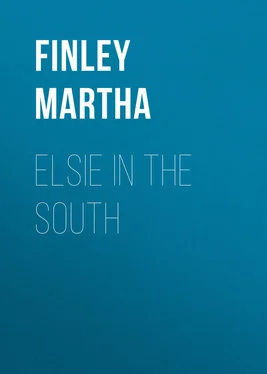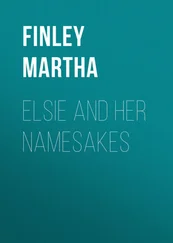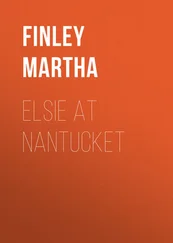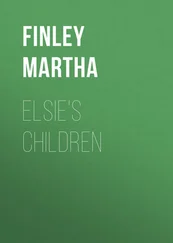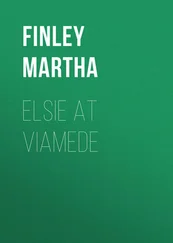Martha Finley - Elsie in the South
Здесь есть возможность читать онлайн «Martha Finley - Elsie in the South» — ознакомительный отрывок электронной книги совершенно бесплатно, а после прочтения отрывка купить полную версию. В некоторых случаях можно слушать аудио, скачать через торрент в формате fb2 и присутствует краткое содержание. Жанр: foreign_religion, foreign_antique, foreign_prose, foreign_children, на английском языке. Описание произведения, (предисловие) а так же отзывы посетителей доступны на портале библиотеки ЛибКат.
- Название:Elsie in the South
- Автор:
- Жанр:
- Год:неизвестен
- ISBN:нет данных
- Рейтинг книги:4 / 5. Голосов: 1
-
Избранное:Добавить в избранное
- Отзывы:
-
Ваша оценка:
- 80
- 1
- 2
- 3
- 4
- 5
Elsie in the South: краткое содержание, описание и аннотация
Предлагаем к чтению аннотацию, описание, краткое содержание или предисловие (зависит от того, что написал сам автор книги «Elsie in the South»). Если вы не нашли необходимую информацию о книге — напишите в комментариях, мы постараемся отыскать её.
Elsie in the South — читать онлайн ознакомительный отрывок
Ниже представлен текст книги, разбитый по страницам. Система сохранения места последней прочитанной страницы, позволяет с удобством читать онлайн бесплатно книгу «Elsie in the South», без необходимости каждый раз заново искать на чём Вы остановились. Поставьте закладку, и сможете в любой момент перейти на страницу, на которой закончили чтение.
Интервал:
Закладка:
"The historian goes on to tell us that when Mocoso's mother heard where he had gone she was terrified at the thought of what injury might be done to him – no doubt remembering the sad misfortune of Ucita and his mother, so cruelly dealt with by the treacherous Spaniards. In the greatest distress she hurried to the camp of De Soto and implored him to set her son at liberty and not treat him as Ucita had been treated by Pamphilo. 'If he has offended you,' she said, 'consider that he is but young and look upon his fault as one of the common indiscretions of youth. Let him go back to his people and I will remain here and undergo whatever sufferings you may choose to inflict.'"
"What a good kind mother!" exclaimed Elsie Raymond. "I hope they didn't hurt her or her son either."
"No," said her mother; "De Soto tried to convince her that he considered himself under obligations to Mocoso, and that he had only intended to treat him in a most friendly manner. But all he could say did not remove the anxiety of the poor frightened woman, for she had come to believe the whole Spanish nation treacherous and cruel. Mocoso himself at last persuaded her that he was entirely free to go or stay as he pleased. Still she could not altogether banish her fears, and before leaving she took Juan Ortiz aside and entreated him to watch over the safety of his friend, and especially to take heed that the other Spaniards did not poison him."
"Did Mocoso stay long? and did they harm him, mamma?" asked Elsie.
"He stayed eight days in the Spanish camp," replied Violet; "being inspired with perfect confidence in the Christians."
"Christians, mamma? What Christians?" asked Ned.
"That was what the Spaniards called themselves," she answered; "but it was a sad misnomer; for theirs was anything else than the spirit of Christ."
CHAPTER IV
The next evening the same company, with some additions, gathered in the library at Woodburn, all full of interest in the history of Florida and anxious to learn what they could of its climate, productions, and anything that might be known of the tribes of Indians inhabiting it before the invasion of the Spaniards.
At the earnest request of the others Grandma Elsie was the first narrator of the evening.
"I have been reading Wilmer's 'Travels and Adventures of De Soto,'" she said. "He tells much that is interesting in regard to the Indians inhabiting Florida when the Spaniards invaded it. One tribe was the Natchez, and he says that they and other tribes also had made some progress in civilization; but the effect of that invasion was a relapse into barbarism from which they have never recovered. At the time of De Soto's coming they had none of the nomadic habits for which the North American Indians have since been remarkable. They then lived in permanent habitations and cultivated the land, deriving their subsistence chiefly from it, though practising hunting and fishing, partly for subsistence and partly for sport. They were not entirely ignorant of arts and manufactures and some which they practised were extremely ingenious. They had domestic utensils and household furniture which were both artistic and elegant. Their dresses, especially those of the females, were very tasteful and ornate. Some specimens of their earthenware are still preserved and are highly creditable to their skill in that branch of industry. Among their household goods they had boxes made of split cane and other material, ingeniously wrought and ornamented; also mats for their floors. Their wearing apparel was composed partly of skins handsomely dressed and colored, and partly of a sort of woven cloth made of the fibrous bark of the mulberry tree and a certain species of wild hemp. Their finest fabrics, used by the wives and daughters of the caciques, were obtained from the bark of the young mulberry shoots beaten into small fibres, then bleached and twisted or spun into threads of a convenient size for weaving, which was done in a very simple manner by driving small stakes into the ground, stretching a warp across from one to another, then inserting the weft by using the fingers instead of a shuttle. By this tedious process they made very beautiful shawls and mantillas, with figured borders of most exquisite patterns."
"They must have been very industrious, I think," said Elsie.
"Yes," assented her grandmother. "The weavers I presume were women; but the men also seem to have been industrious, for they manufactured articles of gold, silver, and copper. None of iron, however. Some of their axes, hatchets, and weapons of war were made of copper, and they, like the Peruvians, possessed the art of imparting a temper to that metal which made it nearly equal to iron for the manufacture of edge tools. The Peruvians, it is said, used an alloy of copper and tin for such purposes; and that might perhaps be harder than brass, which is composed chiefly of copper and zinc."
"Had they good houses to live in, grandma?" asked Ned.
"Yes," she replied; "even those of the common people were much better than the log huts of our Western settlers, or the turf-built shanties of the Irish peasantry. Some were thirty feet square and contained several rooms each, and some had cellars in which the people stored their grain. The houses of the caciques were built on mounds or terraces, and sometimes had porticos, and the walls of some were hung with prepared buckskin which resembled tapestry, while others had carpets of the same material. Some of their temples had sculptured ornaments. A Portuguese gentleman tells of one on the roof or cupola of a temple which was a carved bird with gilded eyes.
"The religion of the Natchez resembled that of the Peruvians; they worshipped the sun as the source of light and heat, or a symbol of the divine goodness and wisdom. They believed in the immortality of the human soul and in future rewards and punishments; in the existence of a supreme and omnipotent Deity called the Great Spirit and also in an evil spirit of inferior power, who was supposed to govern the seasons and control the elements. They seem not to have been image-worshippers until the Spaniards made them such. Their government was despotic, but not tyrannical. They were ruled by their chiefs, whose authority was patriarchal, who were like popes or bishops, rather than princes, but who never abused their power."
Grandma Elsie paused as if she had finished her narration and Ned exclaimed, "Oh, that isn't all, grandma, is it?"
"All of my part of the account, for the present at least," she said with her sweet smile. Then turning to Lucilla:
"You will tell us the story of the Princess Xualla, will you not?"
"You could surely do it much better than I, Grandma Elsie," was the modest rejoinder; "but if you wish it I will do my best."
"We do," replied several voices, and Lucilla, encouraged by a look and smile from her father which seemed to speak confidence in her ability, at once began.
"It seems that De Soto, not finding there the gold for which he had come, and encouraged by the Indians, who wanted to be rid of him, to think that it might be discovered in regions still remote, started again upon his quest, taking a northerly or northwesterly direction.
"As they journeyed on they came to a part of Florida governed by a female cacique – a beautiful young girl called the Princess Xualla. Her country was a fine open one, well cultivated. They reached the neighborhood of her capital – a town on the farther side of a river – about an hour before nightfall. Here they encamped and were about to seize some Indians to get from them information of the country and people. But some others on the farther side of the stream hastened over in a canoe to ask what was wanted.
"De Soto had had a chair of state placed on the margin of the stream and placed himself in it. The Indians saluted him and asked whether he was for peace or for war. He replied that he wished to be at peace and hoped they would supply him with provisions for his army.
Читать дальшеИнтервал:
Закладка:
Похожие книги на «Elsie in the South»
Представляем Вашему вниманию похожие книги на «Elsie in the South» списком для выбора. Мы отобрали схожую по названию и смыслу литературу в надежде предоставить читателям больше вариантов отыскать новые, интересные, ещё непрочитанные произведения.
Обсуждение, отзывы о книге «Elsie in the South» и просто собственные мнения читателей. Оставьте ваши комментарии, напишите, что Вы думаете о произведении, его смысле или главных героях. Укажите что конкретно понравилось, а что нет, и почему Вы так считаете.
